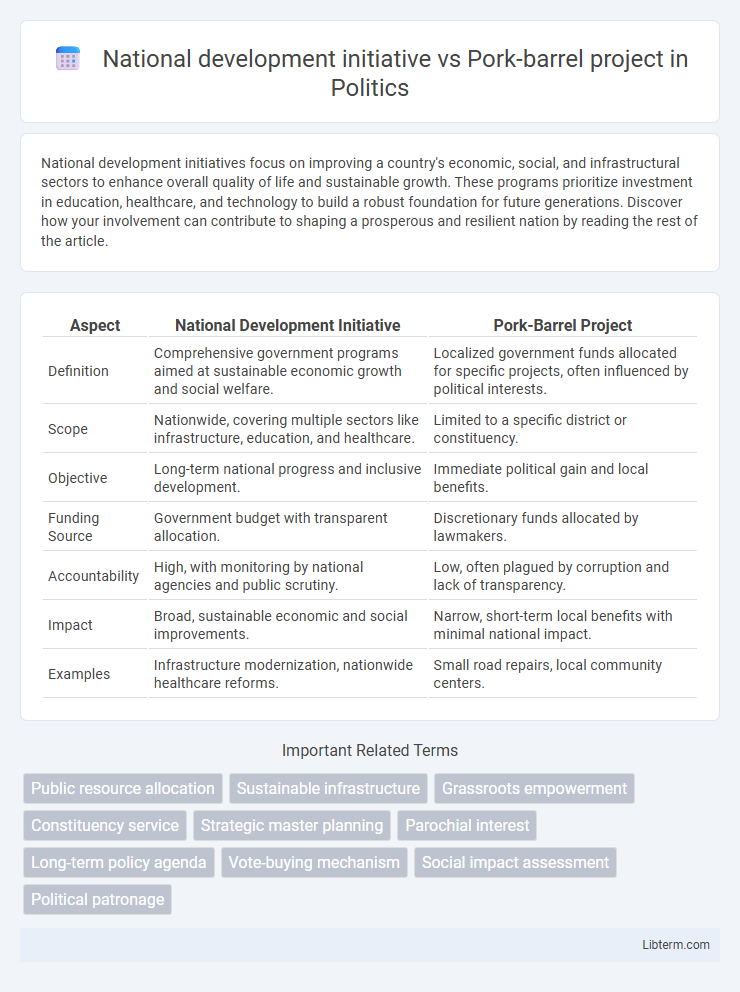National development initiatives focus on improving a country's economic, social, and infrastructural sectors to enhance overall quality of life and sustainable growth. These programs prioritize investment in education, healthcare, and technology to build a robust foundation for future generations. Discover how your involvement can contribute to shaping a prosperous and resilient nation by reading the rest of the article.
Table of Comparison
| Aspect | National Development Initiative | Pork-Barrel Project |
|---|---|---|
| Definition | Comprehensive government programs aimed at sustainable economic growth and social welfare. | Localized government funds allocated for specific projects, often influenced by political interests. |
| Scope | Nationwide, covering multiple sectors like infrastructure, education, and healthcare. | Limited to a specific district or constituency. |
| Objective | Long-term national progress and inclusive development. | Immediate political gain and local benefits. |
| Funding Source | Government budget with transparent allocation. | Discretionary funds allocated by lawmakers. |
| Accountability | High, with monitoring by national agencies and public scrutiny. | Low, often plagued by corruption and lack of transparency. |
| Impact | Broad, sustainable economic and social improvements. | Narrow, short-term local benefits with minimal national impact. |
| Examples | Infrastructure modernization, nationwide healthcare reforms. | Small road repairs, local community centers. |
Defining National Development Initiatives
National development initiatives refer to comprehensive, long-term strategies aimed at improving a country's economic growth, infrastructure, healthcare, education, and overall quality of life through sustainable and inclusive policies. These initiatives prioritize nationwide progress, resource optimization, and transparent governance to address systemic challenges and foster equitable development across regions. In contrast, pork-barrel projects typically involve localized, short-term funding allocated by legislators to specific districts, often criticized for promoting political patronage rather than strategic national advancement.
Understanding Pork-Barrel Projects
Pork-barrel projects refer to government-funded initiatives aimed at benefiting a specific constituency or local area, often used by politicians to secure votes rather than address broader national needs. Unlike national development initiatives, which focus on comprehensive infrastructure, economic growth, and social welfare at a country-wide level, pork-barrel projects prioritize localized interests with limited impact on overall national progress. Understanding pork-barrel projects involves recognizing their role in political patronage and the potential diversion of public resources from large-scale strategic development plans.
Key Objectives of National Development Programs
National development initiatives prioritize sustainable economic growth, infrastructure improvement, social equity, and long-term nation-building over short-term, localized gains. Key objectives include poverty reduction, education enhancement, healthcare access, and environmental sustainability to ensure inclusive development across regions. These programs emphasize transparency and alignment with national policies, contrasting with pork-barrel projects that often prioritize political patronage and constituency-specific benefits.
Characteristics of Pork-Barrel Spending
Pork-barrel spending is characterized by targeted government funds allocated to local districts with the aim of benefiting specific communities, often driven by legislators seeking to secure votes or political support. These projects typically lack comprehensive planning and may prioritize short-term gains over sustainable national development goals. Unlike national development initiatives, pork-barrel projects often face criticism for inefficiency, lack of transparency, and potential misuse of public resources.
Comparing Long-Term Impacts on Society
National development initiatives prioritize sustainable growth, infrastructure, and public welfare, fostering long-term economic stability and social equity. Pork-barrel projects often focus on short-term, localized benefits driven by political agendas, potentially leading to inefficient resource allocation and limited societal impact. Over time, national development initiatives contribute to widespread improvements in education, healthcare, and economic opportunities, whereas pork-barrel projects may exacerbate inequality and hinder comprehensive progress.
Transparency and Accountability Issues
National development initiatives emphasize transparent planning and accountability by involving public stakeholders and using open budgeting processes, reducing corruption risks. Pork-barrel projects often lack transparency due to discretionary fund allocation controlled by individual legislators, which fosters misuse and opaque spending. Enhancing accountability mechanisms and adopting digital tracking systems can mitigate corruption and improve public trust in both approaches.
Funding Mechanisms and Allocation Processes
National development initiatives typically involve transparent, strategic funding mechanisms such as government budgets, international aid, and public-private partnerships aligned with long-term economic goals. In contrast, pork-barrel projects often rely on discretionary or earmarked funds allocated through political influence and legislative maneuvering, resulting in less transparency and inefficiency. The allocation process for national development favors merit-based approvals and rigorous evaluation, while pork-barrel funding is frequently driven by short-term political gains and constituency service.
Case Studies: Successes and Failures
National development initiatives often achieve long-term economic growth and social welfare improvements, as seen in South Korea's Saemaul Undong movement, which successfully enhanced rural infrastructure and community cooperation. Pork-barrel projects, such as the infamous Fertilizer Fund scandal in the Philippines, commonly result in misallocated resources and corruption, undermining public trust and hindering development. Case studies highlight that while targeted national programs foster sustainable progress, pork-barrel politics usually lead to inefficiencies and lost opportunities for genuine national advancement.
Public Perception and Political Influence
National development initiatives are often perceived as essential for long-term economic growth and social progress, garnering broad public support due to their strategic scope and inclusive objectives. Pork-barrel projects, conversely, tend to be viewed skeptically by the public, seen as politically motivated efforts aimed at securing votes rather than addressing systemic issues. Political influence heavily shapes both types of projects, with national development initiatives typically backed by policy experts and institutional frameworks, whereas pork-barrel projects reflect localized political bargaining and patronage networks.
Strategies for Promoting Sustainable Development
National development initiatives prioritize long-term infrastructure, education, and healthcare improvements designed to foster inclusive economic growth and environmental sustainability. Pork-barrel projects, often characterized by short-term, localized expenditures driven by political interests, may lack strategic planning and fail to produce lasting social or ecological benefits. Effective strategies for promoting sustainable development emphasize transparent governance, community engagement, and evidence-based planning to ensure resources contribute to broad, equitable progress.
National development initiative Infographic

 libterm.com
libterm.com